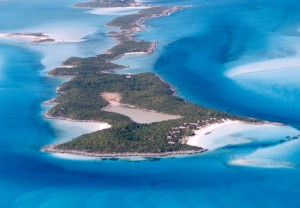Exotic, exclusive and expensive, the Exumas are one of the Caribbean’s most popular private island destinations. Yet whilst the islands paint a paradisiacal picture, it’s a different story below sea level.
Exotic, exclusive and expensive, the Exumas form one of the Caribbean’s most popular private island destinations, with even the likes of Johnny Depp calling the picturesque region home by means of his private island home, Little Halls Pond Cay. Yet whilst the islands themselves paint a perfectly paradisiacal picture, it’s a different story below sea level.
Once amongst the healthiest reefs in the Atlantic region, the Caribbean corals of Lee Stocking Island are slowly – but surely – dying out. Formerly a colourful kaleidoscope of invertebrates, sponges and soft corals, a toxic combination of human disruption and global warming have taken their toll on this ecologically important region, bleaching the reefs and robbing them of their incredible corals.
According to Mike Lesser, a University of New Hampshire professor working at America’s National Science Foundation, whilst the changes in water conditions may look small to a layman, from a historical perspective, “the rate of change is unprecedented in the last million years” – bad news for a life form as delicate as coral.
A notoriously temperamental creature, corals are susceptible to even the slightest changes in temperature and acidity. Even a slightly warmer summer can result in a dramatic drop-off in growth, whereas a sustained increase in temperature – such as that of global warming – causing the corals to die out completely.
The future looks bleak, with even coral coverage in the hardier deep reef regions at an all-time low. “I’m a pessimist,” said Lesser. “Everyone talks about the year 2050 being a tipping point as far as getting greenhouse gases under control. If we go past that tipping point, those reefs that have already changed will probably die.”
Erich Mueller, of the Perry Institute for Marine Science, a non-profit research organization studying the coral reefs of the Bahamas, is similarly pessimistic. “Even if we did everything right starting tomorrow, it would still be a long time before the coral reeds will look like anything robust and diverse.”
He compares the situation to the decimation of the world’s rainforests, explaining that just like one cannot right the wrongs of the deforestation in only a generation; it is not possible to repopulate the world’s coral stocks in less than 30 years. “When I take kids out on the reef, I cannot show them the reefs I saw when I was a kid and I cannot tell them in their world there will be hope of getting it back, not even in their grandkids’ time,” he lamented.
A tragedy in its own right, the destruction of the world’s coral population could also have dire consequences for marine life on a much wider scale – coral reefs are at the bottom of the ocean’s food chain – take them away and the consequences could be catastrophic. The domino effect stretches all the way back to the island communities themselves – who, without revenues generated via fishing and marine-related tourism – could find themselves in a very dire situation indeed.
Perhaps most worryingly of all, this international catastrophe could simply be the beginning of something much bigger. Environmental commentator David Frey describes the decline of coral stocks as a wake-up call for climate sceptics – “They [the corals] are the canary in the coalmine and they’re gasping.”
For more information about this article and further stories about attempts to combat the effects of global warming on private islands and small island communities, stay tuned for more details about OCEANS & PRIVATE ISLANDS, a brand new magazine focusing on the environmental impact on the world’s oceans, coasts and island populations.



